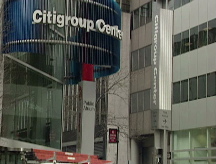Bank stocks take another huge tumble
Shares of many top banks plunged Tuesday as investors fear that many more woes lay ahead; Citi falls below $3.
 |
| Bank stocks have failed to find a bottom in the new year. The S&P Bank is down nearly 31% as of Friday's market close. |
NEW YORK (CNNMoney.com) -- Wall Street could not shake its fears about the health of U.S. banks Tuesday as shares of many leading banks suffered another vicious selloff.
Just days after posting a $8.3 billion loss and unveiling plans to break up the company, Citigroup (C, Fortune 500) shares plunged 20% to finish below $3 a share, as analysts issued a bleak forecast for the banking giant.
Ladenburg Thalmann's Richard Bove and Sanford Bernstein's John McDonald both warned Tuesday they expected the New York City-based company to report a loss for both 2009 and 2010.
One analyst also raised concerns about the health of Wells Fargo (WFC, Fortune 500), one of the better-managed banks during the credit crisis, which is due to report its fourth quarter and full-year results next Wednesday.
Friedman, Billings, Ramsey & Co.'s Paul Miller wrote Tuesday that he expected the company would move to cut its dividend at some point as it continues to grapple with rising credit costs, especially in the wake of the company's acquisition of Wachovia late last year.
"We would continue to avoid the shares until its balance sheet is better capitalized," Miller told clients.
Wells Fargo shares ended nearly 24% lower in Tuesday trading.
Other major financial institutions were also hit hard as more details became available about just how difficult the fourth-quarter was for the financial services industry.
Shares of the institutional money manager State Street (STT, Fortune 500) lost 59% of their value Tuesday after the Boston-based firm reported a steep profit decline during the final three months of 2008 and issued a dismal forecast for 2009.
And after the closing bell Tuesday, State Street rival Bank of New York Mellon (BK, Fortune 500) reported that its fourth-quarter net income plunged 88% from a year ago. Earnings came in at 5 cents a share, missing analysts' forecasts by 64 cents a share. The stock fell more than 17% in regular trading Tuesday.
"It just doesn't seem to end," said Todd Clark, managing director and head of equity trading at Nollenberger Capital Partners Inc. in San Francisco.
That general nervousness spilled over to other parts of the sector, infecting names like Pittsburgh-based PNC (PNC, Fortune 500), whose stock fell 42% from Friday's closing price.
Even JPMorgan Chase (JPM, Fortune 500), one of the most secure banks during the recession, was getting squeezed. Shares finished nearly 21% lower. The bank reported a surprise quarterly profit last week, but CEO Jamie Dimon warned that 2009 would be difficult for his firm and other banks.
Investors were not only focused on the latest bad earnings news, but also the latest government-led efforts aimed at curing the ails of the nation's banking sector.
So far, the government has injected $192 billion into more than 200 financial institutions nationwide.
Just last week, regulators also moved to invest an additional $20 billion into Bank of America to help it complete its purchase of Merrill Lynch. Bank of America (BAC, Fortune 500) stock lost nearly a third of its value Tuesday.
But there have been increasing fears that the problems run so deep in the banking sector that regulators will have to nationalize, or assume control of some institutions,. That would wipe out the value of current shareholders' holdings.
British regulators are believed to be moving in that direction after unveiling their second bank rescue plan Monday. On the same day, the Royal Bank of Scotland booked a loss of more than £20 billion ($30 billion) in 2008, the biggest loss in British corporate history.
Members of the Obama administration have already hinted at what possible steps might be taken next to help banks, including purchasing troubled assets from financial institutions. But no details have been revealed so far.
Some investors, however, are skeptical that the U.S. government would go so far as to nationalize banks since that could deter private investors from offering banks more capital.
"You don't want to wipe out the very guys who are going to fund this industry getting back to health," said Anton Schutz, president of Mendon Capital Advisors, a firm that invests in financial stocks.
Part of the Obama stimulus package is a tax credit of $500 for individuals and $1,000 for couples (with some income restrictions). Tell realstories@cnnmoney.com what you will do with the money if Congress passes the measure. Your responses could be part of an upcoming story. ![]()


